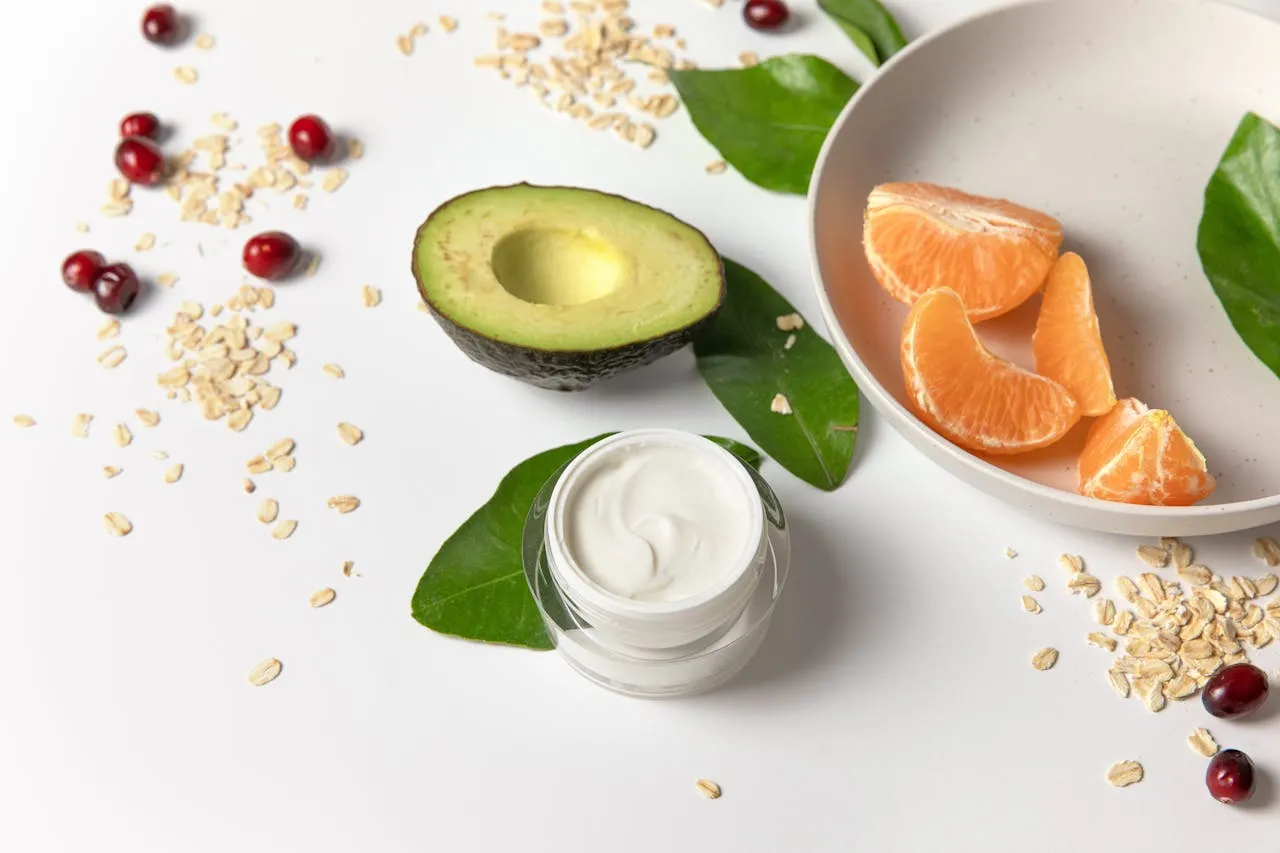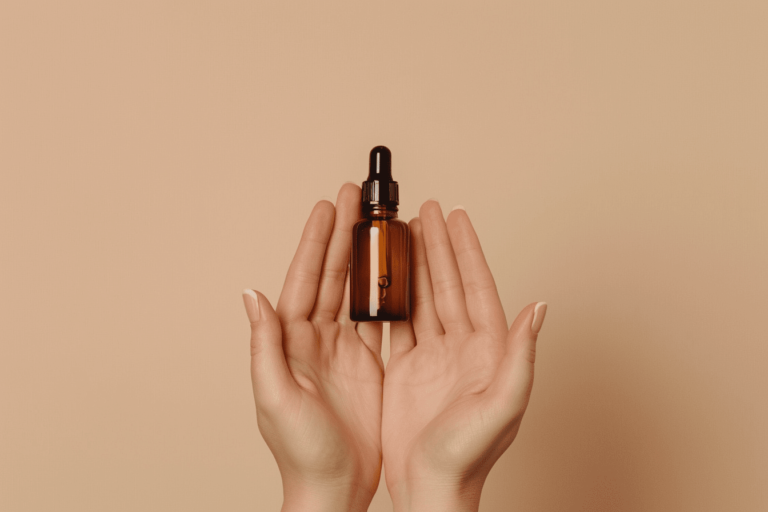The Science Behind Vitamin C in Skincare
You’ve probably heard skincare enthusiasts rave about vitamin C serums, but what makes this ingredient such a powerhouse?
The science behind vitamin C reveals why dermatologists consistently recommend it for achieving healthier, more radiant skin.
Let’s dive into the fascinating world of this essential nutrient.
Understanding Vitamin C: Your Skin’s Best Friend

When you think about vitamin C, you might picture oranges or immune system support. Scientists call it ascorbic acid, and your skin cells desperately need it to function properly.
However, this water-soluble vitamin plays a crucial role in maintaining your skin’s health and appearance.
Your body can’t produce vitamin C naturally, which means you must obtain it through diet or topical application.
This limitation makes vitamin C skincare products particularly valuable for maintaining optimal skin health.
The molecular structure of vitamin C allows it to penetrate your skin’s outer layers effectively.
Once absorbed, it gets to work at the cellular level, triggering various biological processes that benefit your complexion.
The Cellular Magic: How Vitamin C Transforms Your Skin
At the molecular level, vitamin C acts as a powerful antioxidant that neutralizes free radicals in your skin.
These unstable molecules form when your skin encounters environmental stressors like UV radiation, pollution, and cigarette smoke.
Without proper protection, free radicals damage your skin cells and accelerate aging.
When you apply vitamin C topically, it donates electrons to these harmful free radicals, effectively neutralizing them before they can cause damage.
This process protects your existing collagen and prevents premature aging signs like fine lines and dark spots.
Vitamin C also stimulates collagen synthesis in your skin. Collagen serves as the structural protein that keeps your skin firm, plump, and youthful-looking.
As you age, your natural collagen production decreases, leading to wrinkles and sagging skin.
Research shows that vitamin C activates enzymes responsible for collagen formation.
Specifically, it helps hydroxylate proline and lysine, two amino acids essential for creating stable collagen molecules.
This scientific process explains why consistent vitamin C use can improve your skin’s texture and firmness over time.
Different Forms: Choosing the Right Vitamin C for You

Not all vitamin C products work the same way on your skin. Manufacturers use various forms of vitamin C, each with unique properties and benefits.
Understanding these differences helps you choose the most effective product for your specific needs.
L-ascorbic acid represents the purest and most potent form of vitamin C available in skincare.
When you use products containing this ingredient, you’re getting the same molecular structure that your body recognizes and utilizes naturally.
However, L-ascorbic acid can be unstable and potentially irritating for sensitive skin types.
Magnesium ascorbic phosphate offers a gentler alternative that’s less likely to cause irritation. T
his derivative converts to active vitamin C once it penetrates your skin, providing similar benefits with improved stability.
You’ll often find this form in products designed for sensitive or reactive skin.
Sodium ascorbyl phosphate works similarly to magnesium ascorbyl phosphate but offers additional antimicrobial properties.
This makes it particularly beneficial if you struggle with acne-prone skin, as it can help reduce breakouts while providing antioxidant protection.
Ascorbic glucoside represents another stable derivative that gradually releases vitamin C into your skin over time.
This slow-release mechanism provides sustained benefits and reduces the likelihood of irritation, making it suitable for daily use.
The Brightening Effect: Science Behind Radiant Skin
One of vitamin C’s most celebrated benefits is its ability to brighten your complexion and fade dark spots.
This effect occurs through a specific scientific mechanism that inhibits melanin production in your skin cells.
Melanin gives your skin its color and forms in response to UV exposure, inflammation, or hormonal changes.
When melanin production becomes irregular, you develop hyperpigmentation, age spots, or post-inflammatory marks from acne.
Vitamin C interrupts the melanin formation process by inhibiting tyrosinase, a key enzyme responsible for melanin synthesis.
When you apply vitamin C consistently, it gradually reduces the appearance of existing dark spots while preventing new ones from forming.
This brightening effect doesn’t happen overnight. You typically need to use vitamin C products for several weeks to notice significant improvements in skin tone evenness.
The scientific literature suggests that consistent use over 6-12 weeks produces the most dramatic results.
Additionally, vitamin C enhances your skin’s natural exfoliation process, helping remove dead skin cells that can make your complexion appear dull.
This gentle exfoliating action reveals fresher, more radiant skin underneath.
Protection Against Environmental Damage
Your skin faces constant assault from environmental aggressors that accelerate aging and damage.
Vitamin C provides a crucial defense system against these harmful influences, acting as your skin’s personal bodyguard.
UV radiation from the sun generates reactive oxygen species (ROS) in your skin, leading to DNA damage, inflammation, and premature aging.
While vitamin C isn’t a substitute for sunscreen, it provides additional protection by neutralizing these harmful molecules.
Studies demonstrate that vitamin C can reduce UV-induced skin damage by up to 60% when used consistently.
This protection extends beyond just preventing sunburn; it helps preserve your skin’s structural integrity and prevents long-term photodamage.
Pollution represents another significant threat to your skin health. This proactive approach helps maintain healthier, more resilient skin over time.
Particulate matter and toxic chemicals in polluted air can penetrate your skin and trigger inflammatory responses.
Vitamin C’s antioxidant properties help neutralize these pollutants before they can cause lasting damage.
When you use vitamin C products regularly, you’re essentially creating a protective barrier that shields your skin from daily environmental stressors.
Optimal Usage: Maximizing Vitamin C Benefits

Getting the most from your vitamin C skincare routine requires understanding proper application techniques and timing.
The science behind vitamin C absorption reveals specific strategies that enhance its effectiveness on your skin.
Most dermatologists recommend applying vitamin C products in the morning to take advantage of their protective properties throughout the day.
Your skin can better defend against environmental damage when fortified with antioxidants from the start.
Start with lower concentrations (around 10-15%) if you’re new to vitamin C. Apply vitamin C to clean, dry skin before moisturizer and sunscreen.
This approach allows your skin to build tolerance gradually while minimizing the risk of irritation. You can increase the concentration over time as your skin adapts.
This layering sequence ensures optimal absorption and prevents interference from other products. Wait a few minutes between applications to allow each product to absorb fully.
Store your vitamin C products properly to maintain their potency. Keep them in cool, dark places away from direct sunlight and heat.
Some formulations benefit from refrigeration, which can extend their shelf life and provide a refreshing application experience.
Common Mistakes That Reduce Effectiveness
Many people unknowingly sabotage their vitamin C results through improper usage or product combinations.
Understanding these common pitfalls helps you avoid them and achieve better outcomes.
Mixing vitamin C with certain ingredients can reduce its effectiveness or cause irritation.
Avoid combining it with retinol, benzoyl peroxide, or alpha/beta hydroxy acids in the same routine. These combinations can destabilize vitamin C or increase skin sensitivity.
Using expired or oxidized vitamin C products wastes your time and money. Applying too much product doesn’t increase benefits and may cause irritation.
You can identify oxidized vitamin C by its brown or yellow color and metallic smell. Fresh vitamin C should appear clear or slightly yellow and have minimal odor.
A few drops of serum or a thin layer of cream provides sufficient vitamin C for your entire face. More isn’t always better with skincare ingredients.
Inconsistent use prevents you from seeing optimal results. Vitamin C works best with regular application over extended periods.
Sporadic use won’t provide the cumulative benefits that make this ingredient so valuable.
Choosing Quality Products: What Science Says
The skincare market offers countless vitamin C products, but not all formulations deliver the promised benefits.
Scientific research provides guidance on identifying effective products that will actually improve your skin.
Look for products packaged in dark, opaque containers that protect vitamin C from light degradation.
Clear or transparent packaging allows light to break down the active ingredients, reducing their potency over time.
Check the pH level of vitamin C products before purchasing. L-ascorbic acid works best at a pH between 3.5 and 4.0, while derivative forms can function effectively at higher pH levels.
Products with inappropriate pH levels won’t deliver optimal results. Consider the concentration carefully based on your skin type and experience level.
Beginners should start with 10-15% concentrations, while experienced users can handle 15-20%. Higher concentrations aren’t necessarily better and may cause unnecessary irritation.
Read ingredient lists to identify stabilizing compounds that enhance vitamin C effectiveness.
Ingredients like vitamin E (tocopherol) and ferulic acid work synergistically with vitamin C, boosting its antioxidant power and stability.
The Future of Vitamin C in Skincare

Ongoing research continues to reveal new applications and improvements for vitamin C in skincare formulations.
Scientists are developing innovative delivery systems that enhance stability and penetration while reducing irritation potential.
Encapsulation technology represents one promising advancement that protects vitamin C molecules until they reach target skin cells.
This approach maintains potency while providing controlled release over extended periods.
Researchers are also exploring combinations of different vitamin C forms within single products.
These hybrid formulations aim to provide immediate and long-lasting benefits by utilizing the unique properties of various derivatives.
Nanotechnology applications may revolutionize vitamin C delivery in the future.
Nano-sized particles can penetrate deeper skin layers more effectively, potentially enhancing the ingredient’s therapeutic benefits.
Conclusion
Vitamin C stands as one of skincare’s most scientifically proven ingredients, offering protection, repair, and enhancement for healthier skin.
Understanding the science empowers you to choose and use vitamin C products effectively.






